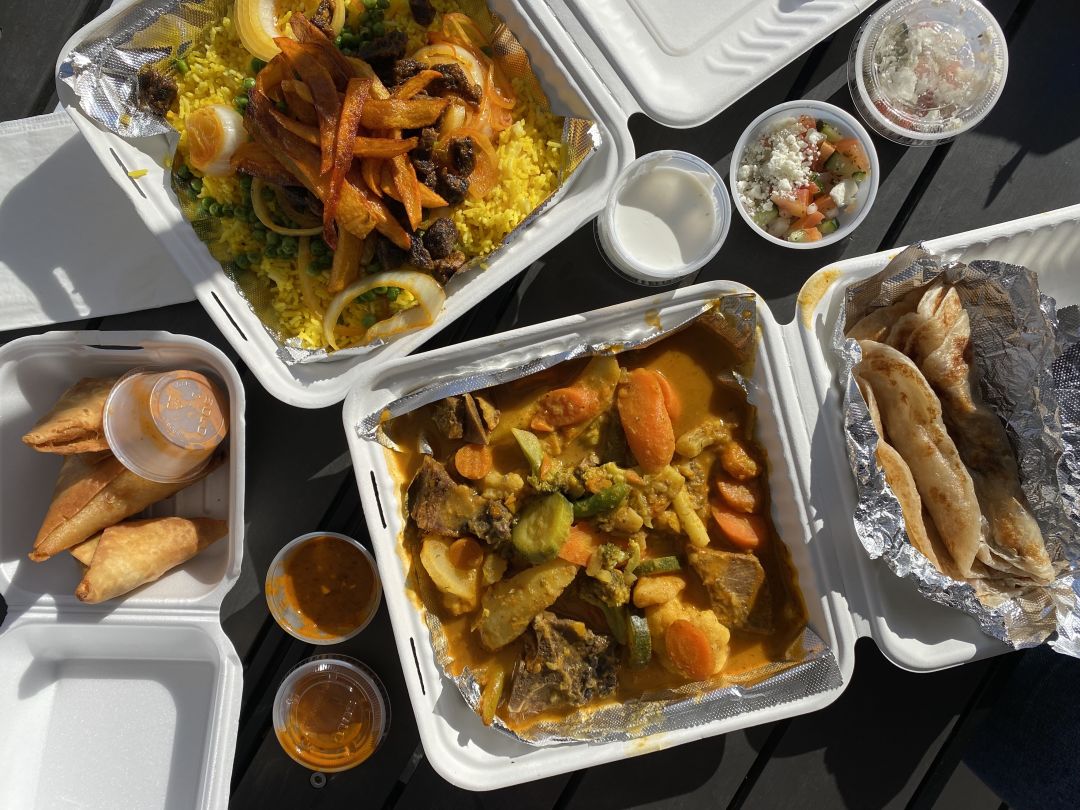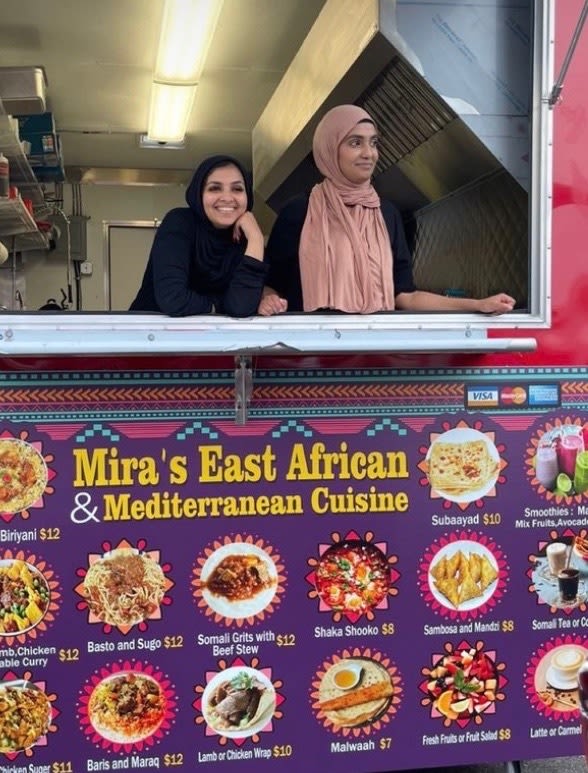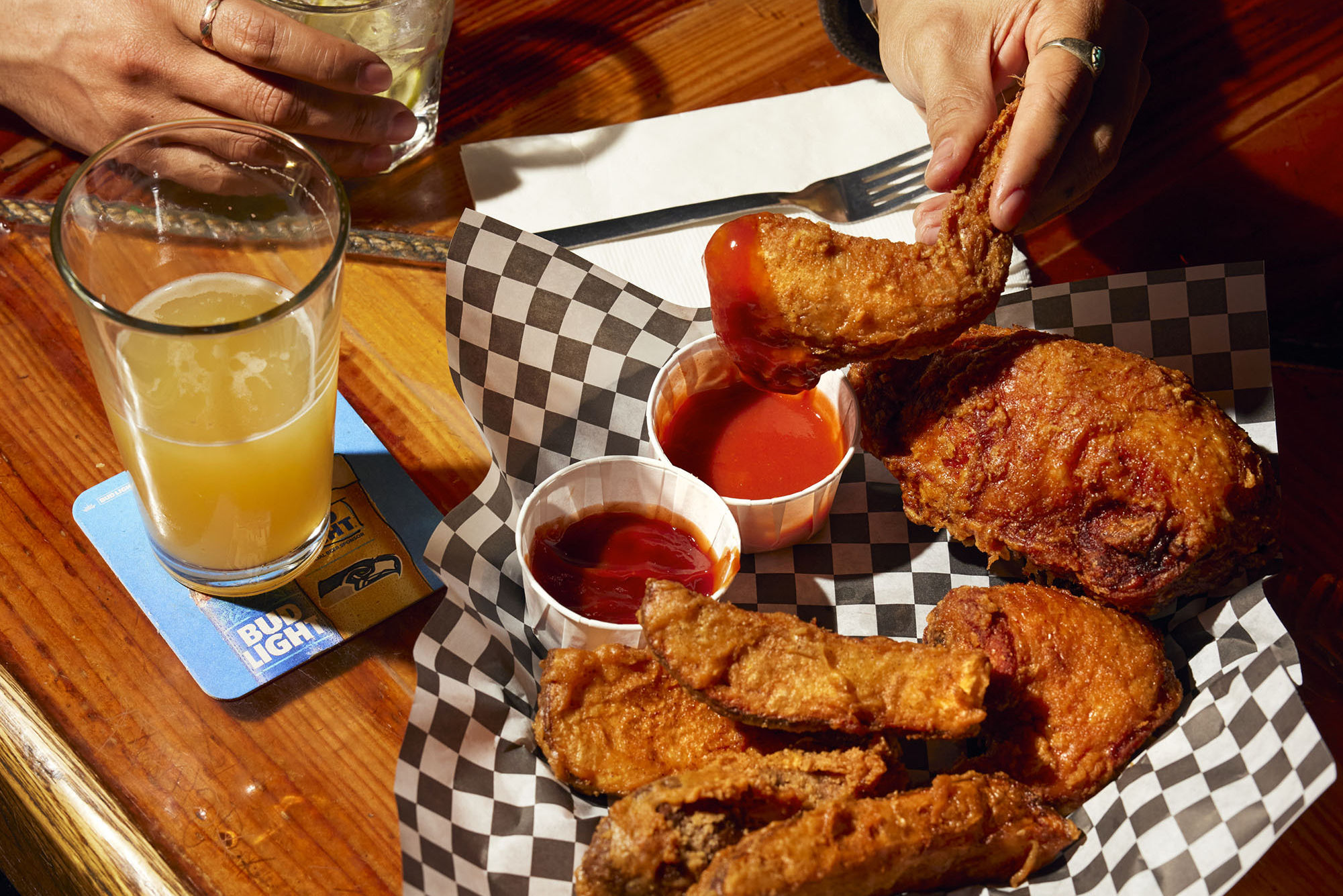Mira’s East African Cuisine Is a Somali Food Gem

A spread of dishes from Mira's East African & Mediterranean Cuisine, clockwise from left: sambosas, beef suqer, subayaad, and lamb curry.
Image: Katherine Chew Hamilton
How can a dish you’ve never tried before make you feel immediately at home? I’m not sure, but that’s somehow the case at Montavilla cart Mira’s East African and Mediterranean Cuisine (8220 NE Davis St), which opened last August and re-opened in December after a few months’ hiatus. Owner Samira Mohamed, whose family came from Somalia to Oregon as refugees when she was a child, welcomes guests to the cart with a smile, ready with recommendations and eager to answer questions about the cuisine she grew up eating and cooking. The made-from-scratch food, from curries to rice dishes to flaky flatbread, is vibrant, colorful, and plentiful. Added up, the experience is more like a backyard dinner party than a food cart pod meal.
Mohamed has dreamed of starting her own cart ever since her days as a student at Portland State University, where she frequented the Indian and Thai food carts nearby. “I love trying new things, and I love the food cart culture in Portland,” she says.

Mohamed, right, and her sister at the opening of the cart
Image: Courtesy Samira Mohamed
While at PSU, she studied social work and went on to work with Multnomah County and the Immigrant and Refugee Community Organization, where she helped refugee families from all over the world adjust to life in the United States. “There are a lot of Somali immigrants that receive services there, including my family back in the day,” she says. “That's why I always felt the need to work there, because it played a huge role in my life.”
When the pandemic hit, she decided it was time to switch gears and fulfill her dream of opening a business: a food cart that would proudly put her culture on the map. Though Portland has a sizable Somali community, there weren’t many Somali restaurants here when Mohamed was growing up.
“Somali restaurants are growing [in number], but it’s still limited here in Portland. That’s the problem—our food is not well known, per se. If someone wants to dine out, they go, ‘I feel like eating Thai, or I feel like eating sushi today, or Mexican food.’ No one's gonna say, ‘Oh, I feel like eating Somali food.’”
That’s made running a food cart even harder than normal as a first-time, first-year cart owner in the middle of a pandemic with rising food costs. “It's really hard to increase your price when your food is not well-known,” Mohamed says.
Yet this is a cuisine that just about anyone could love. For first-timers, Mohamed recommends the suqer, a dish of yellow-stained rice, each tender grain separate from another; it’s nestled under morsels of beef or chicken, plus thinly sliced potatoes reminiscent of home fries. Top it with the accompanying yogurt sauce and the thick, fragrant red hot sauce, and cool off between bites with a refreshing cucumber, tomato, and feta salad.
Another knockout: vegetable curry loaded with cauliflower, yellow and green beans, carrots, and potatoes, with the option to add lamb, beef, or chicken. Mohamed wouldn’t tell me much about the curry other than that it was made with typical Somali spices like ginger, cardamom, and turmeric, and that she adds her own twist—coconut milk rather than the typical sour cream or yogurt. It’s unlike any curry I’ve tasted before, falling somewhere between aloo gobi, a Thai yellow curry, and an Ethiopian veggie sampler. Get the subaayad, a handmade, layered flatbread that’s loaded with butter, to scoop up every bit of the sauce. Carnivores can’t go wrong with adding lamb, its juicy riblets and floral notes amping up the curry.
The sambosas are a hit, too, stuffed with ground beef and potatoes and fried until crackly, yet somehow not overly oily. They’re still crunchy fifteen minutes after they come out of the fryer, an accomplishment few fried foods achieve. Drench in spicy red sauce for best results.
On my list to try next: the baris and maraq, a lamb stew and rice dish that Mohamed says is essential to Somali parties, and the milky tea loaded with cinnamon, cardamom, and cloves. There’s also a Somali take on spaghetti—basto and sugo—that I can’t wait to sample. And yes, there are lamb gyros, and someday, Mohamed is thinking of expanding the menu to include more Mediterranean items. But I figure, why do that when I could try all these dishes from this new-to-me cuisine instead? Portland could be the next hotspot for Somali cuisine, starting right at this cart.




